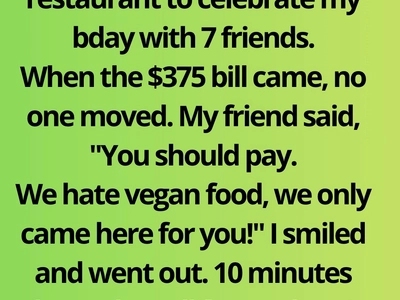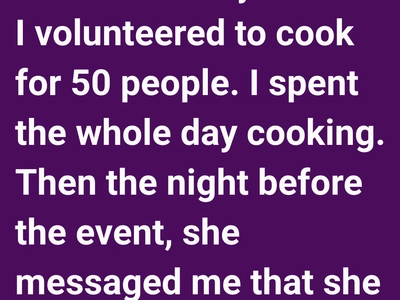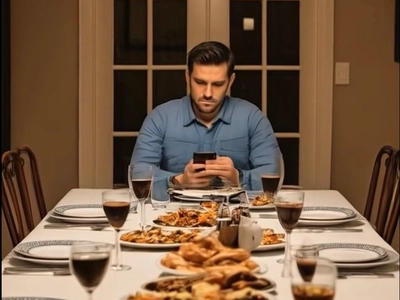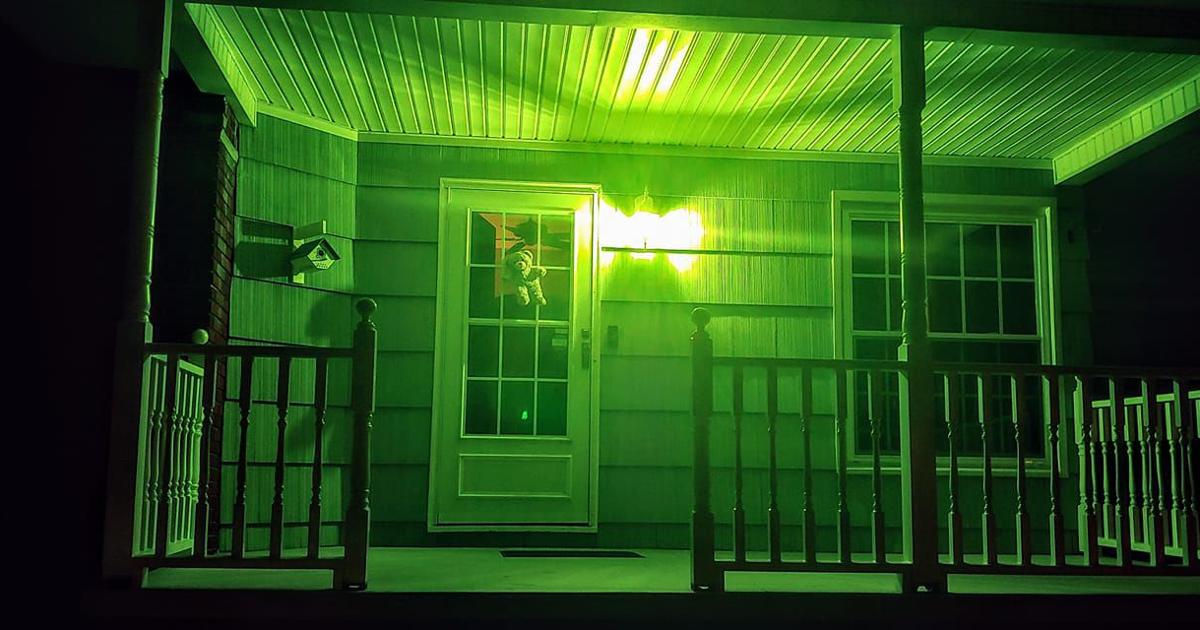The Birthday Dinner That Ended With an Unforgettable Lesson
I had been looking forward to my birthday dinner for weeks. It wasn’t meant to be a big party or anything fancy—just a warm, intimate evening with a few close friends, the people who truly mattered to me. I wanted it to feel relaxed and real, like the kind of night where you could forget time and just enjoy being together. After some searching, I picked a small vegan restaurant tucked away on a quiet street. The place had this calm glow about it—soft lights, wooden tables, and the faint sound of mellow jazz playing in the background. It felt peaceful, cozy, and perfect for the kind of celebration I had in mind.
Everyone arrived with smiles and hugs, filling the space with the easy kind of laughter that only happens among people who’ve known each other for years. We ordered wine and shared plates, passing dishes around and teasing one another over old memories. Someone brought up a road trip we’d taken ages ago, and soon everyone was laughing again, remembering the flat tire in the middle of nowhere and the way we’d somehow turned that disaster into one of our favorite stories. The food was beautiful—bright colors, bold flavors, the kind that make you stop for a second and actually taste. It felt like the perfect night.
But as the evening stretched on, that perfect feeling began to shift, so subtly that I didn’t notice it right away. It started when the waiter approached the table with the check. I was still smiling when he placed it down, tucked neatly inside a small black folder. The total was $375. For a moment, no one said a word. The sound of the music faded into the background, and I felt everyone’s eyes quietly flicker toward the bill, then away again.
I waited, expecting someone to break the silence. Normally, in our group, we just split things evenly without a second thought. But this time, the pause lingered. Then one friend—a guy I’d known since college—gave a little laugh and said, “Well, it’s your birthday. You should cover it!”
The words hung there, half-joking, half-serious. Everyone else chuckled nervously, and then the silence crept back.
I felt something tighten in my chest. I forced a small smile and tried to laugh it off, pretending it didn’t sting as much as it did. “Yeah, sure,” I said lightly, though my voice didn’t sound like my own. I reached for my glass instead of the bill and took a slow sip, trying to buy myself a second to think.
Inside, though, I felt a strange mix of disappointment and confusion. It wasn’t about the money, not really. I could afford it. It was about what it represented—the assumption that because it was my birthday, I somehow owed them the evening. That the night was something they were attending, not sharing.
After a few moments, I excused myself and stepped outside.
The night air hit my face, cool and steady. I stood there on the sidewalk, watching cars glide past under the yellow glow of the streetlights. The laughter from inside had faded into a soft hum behind me. I wasn’t angry, I realized. Just quietly hurt. It wasn’t even their fault, not entirely. We all grow up with different ideas about what celebrations mean. Some people think birthdays are about being treated; others think they’re about treating others. But to me, birthdays were about appreciation—about feeling seen and valued by the people you care about.
I leaned against the brick wall of the restaurant and took a deep breath. The smell of night air mixed with the faint scent of food drifting through the open door. I thought about all the years I’d spent celebrating with this same group—the laughter, the memories, the late-night talks. They were good people. Maybe they just hadn’t thought about what their words meant.
I pulled out my wallet and counted the cash I had on me. Then, as an idea began to take shape in my mind, I smiled a little to myself. It wasn’t about proving a point—it was about making one, gently.
When I went back inside, everyone looked up. I could tell they’d been talking about it, the air still thick with that awkward tension people try to laugh away. I sat down, calm now, and reached into my bag. From it, I pulled out eight small envelopes. Each one had a name written on the front in neat handwriting.
Without saying anything, I passed them around the table, one by one. My friends looked at me curiously. “What’s this?” someone asked, half laughing.
“Just something small,” I said softly.
They began opening the envelopes, and for a moment, the only sound in the room was the gentle rustle of paper. Inside each one was a short handwritten note—a simple thank-you for coming, for sharing the evening, for being part of my life. And tucked inside each envelope was exactly the amount of their meal.
No one spoke. The laughter didn’t return this time. Instead, a quiet kind of guilt spread across their faces, soft but unmistakable.
After a few seconds, I broke the silence. “I’m really glad you all came tonight,” I said, my voice calm and steady. “But I think a celebration only feels right when everyone shares in it—both the happiness and the cost.”
No one argued. No one even looked at each other for a while. Then, slowly, they began taking out their wallets. One by one, they placed their share of the money on the table. There were murmured apologies, a few awkward laughs, and one friend even said, “I didn’t realize… I’m sorry.”
I smiled and shook my head. “It’s okay,” I said. “I just wanted us to be honest—with each other, and with what this night means.”
After that, the energy changed again—not back to the carefree laughter from earlier, but to something quieter, more real. The tension eased little by little. Someone raised a glass and said, “To shared birthdays,” and everyone joined in. It wasn’t the same kind of joy as before, but maybe that was okay. Maybe it didn’t need to be.
When the night finally ended, I walked home alone under the soft glow of the streetlights. The air was cool again, and the city had that peaceful hum it gets late at night, when most people are already home. I thought about what had happened—not with bitterness, but with a strange sense of calm. It wasn’t about being right or wrong. It was about understanding what I valued, and realizing that sometimes, people only learn what matters when you show them.
The next morning, my phone buzzed with messages. A few of my friends had texted to apologize again. One said, “You made me think about how I’ve handled things before. You were right.” Another wrote, “Thank you for not making a scene. You handled it better than I would have.”
Their words warmed me, more than I expected. It wasn’t validation I needed—it was connection, the kind that comes from honesty.
Over the following weeks, something interesting happened. My friends started changing the way they did things. When we went out, they split the check without hesitation. If it was someone’s birthday, they’d bring a small gift or pay for their drink—not because they had to, but because they wanted to. It was subtle, but I could see the shift.
And maybe the most surprising part was that we all grew a little closer. That night had cracked something open—a truth that had always been there but never spoken. Friendship isn’t about convenience or tradition. It’s about presence, respect, and awareness. It’s about showing up not just when it’s easy, but when it matters.
Sometimes, it takes a small, uncomfortable moment to teach a lasting lesson. I learned that from a $375 bill and eight envelopes.
Since then, I’ve thought a lot about how we celebrate each other. We throw parties, give gifts, make toasts—but underneath it all, what we really want is to feel appreciated, to know that our presence means something. And appreciation isn’t measured in money or gifts; it’s in gestures, in shared effort, in the quiet understanding that no one’s taking more than they give.
Looking back, I think that night changed me in ways I didn’t expect. It made me more mindful, not just about birthdays or dinners, but about how I show up for people too. I started paying closer attention—offering help before it was asked for, listening more carefully, giving without expecting anything back. The funny thing is, once you start doing that, the world around you starts to reflect it.
The next year, when my birthday came around again, I decided to celebrate differently. I invited everyone over to my place instead. I cooked a simple meal—nothing fancy, just good food and good company. We sat around my dining table, candles flickering, plates scattered with half-eaten food and the kind of easy laughter that comes when everyone feels comfortable. When the night ended and someone asked, “How much do we owe you?” I smiled and said, “Nothing. Just promise to come next time and bring something you love.”
They did. The next gathering was filled with homemade dishes, shared wine, and that effortless warmth I’d always hoped for. We’d learned, together, what it meant to celebrate properly—not by counting what we spent, but by recognizing what we gave.
That birthday a year earlier—awkward, tense, uncomfortable—had become the quiet turning point for all of us. It reminded me that honesty, even when it’s uncomfortable, can build deeper connections than politeness ever will. Sometimes, the most meaningful gifts we give each other are not wrapped in paper but found in the moments we choose to stand up for what feels right, gently and with love.
And every time I pass that little vegan restaurant now, I smile. I remember that night, not with pain or embarrassment, but with gratitude. Because that was the evening I learned that true friendship doesn’t need to be perfect—it just needs to be sincere. It’s not about showing up for the fun, but showing up with respect.
Sometimes, the smallest gesture—a few envelopes and a quiet truth—can speak louder than any words ever could.






